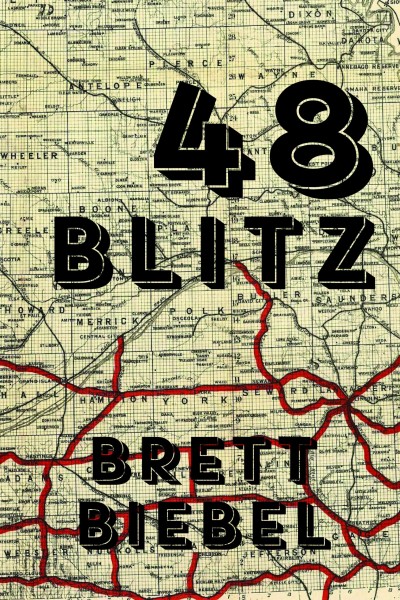
by Beret Olsen
Given that Brett Biebel has divided his debut collection into quarters and titled it 48 Blitz, I figure I should offer full disclosure up front: I know next to nothing about football. I had to Google blitz and Huskers and the title of the opening story, “Big Red Nation,” a phrase that made me nervous. It’s not what you think. Unless you’re a Husker—in which case, you already know.
Dakota-born and bred, I do know something about the Midwest, though, about High Life beers and endless sky. I remember the smell of the stockyard when the wind blew from the East, and how it felt when the rest of the country barreled past on the freeway and rolled their eyes. Biebel nails it.
With his road atlas handy, he set all forty-eight stories along Nebraska’s leg of Interstate 80, giving voice to folks who rarely speak for themselves in literary fiction. Narrators engage with readers as peers, using the clipped vernacular of pals shooting the breeze over a cold one. Maybe it’s getting late. Maybe Mike’s date or crazy Eddie’s neighbor is in a philosophical funk, so their stories unfurl like flawed memories, like small-town legends. Characters and subjects pop up intermittently—a guy named Adler, the death penalty, the Heart Attack Platter from Mulberry’s—which adds to the feeling you’re hanging out with friends and family. The overall effect is one of camaraderie with a raw, melancholic afterbite.
A little eccentric, often humorous, and occasionally drunk, Biebel’s vivid characters are sitting on the roof, campaigning in bowling alleys, and stripping naked to pose with half a dead deer. And, like everyone else, they are looking for meaning in the face of mortality, grief, and disappointment.
In “Fat Man,” the narrator interviews a man who has set up a twenty-foot cardboard cutout of a LGM-30 Minuteman III ICBM on the side of the highway with a sign reading, “Ask me about my missile.” Claiming his mission to be education, or civil disobedience, or revolution, he muses about how “sons a bitches” underground in Nebraska can bomb a village on the other side of the planet. Though he speaks of accountability, at the heart of his story is a desire to be seen.
“You know what they get in New York?” he asks. “Everything we grow served up in nice, clean packages under bright lights and antiseptic smells. And here we are with the feedlots and slaughterhouses and goddamn instruments of death,” (p. 22).
While characters and content shift readily, a feeling of doom lingers—and not just in the stories about lawsuits and executions. Rob, obsessed with a woman named “Lisa or Louise or Lorraine,” scribbles a secret message to her on a football and lobs it over the fence of the missile site where she works. “She looked like a cheerleader or 4-H girl and worked underground flipping switches and answering phones, and she was about the only thing between any of us and the apocalypse, us and radioactive decay,” (p. 117). The conflation of a broken heart and the end of the world feels spot on. Meanwhile, his buddies wonder why they’re friends with Rob, and what he thinks he’s doing. “We thought it might have been about activism or surveillance, or else maybe just insanity, and maybe he was going to sit there forever, listening to wild prairie and waiting for the end of the world,” (p. 118).
Sprinkled throughout the collection are more experimental pieces written from radical vantage points: a story about addiction told through the insurance claims process; another about a missing woman, distilled from the information in her cyber cloud. Most potent and chilling of these is “Supply and Demand,” which traces a gun from smelted aluminum in Iowa, through various departments and countries and politicians and hand jobs—all in the shadow of an unnamed corpse from Custer County.
The final story of the 4th Quarter sat strangely with me. “Luisa” felt different in length, period, style, and flavor. But perhaps I was just sullen to find myself at the end of the game.
Instead, I’ll leave you with an image from earlier in the quarter, when a new stadium opens, and half the town comes to run around on the field and eat Husker Hot Dogs. “Before the place closed, we laid on our backs and saw gnats swarming. Heard cars flying by on the interstate. We told ourselves we pitied them. That we wouldn’t trade places, not for a second, and, wherever they’re going, it can’t be nearly this good,” (p. 111).
Home towns are a mixed bag: pride and loyalty, comedy and tragedy, a lot of absurdity with a little disillusionment to boot. It’s all in here. Well played, Brett Beibel.
_______________________
 Beret Olsen is a writer, a photographer, and the photo editor for 100 Word Story. Her art, essays, and fiction have appeared in publications including First Class Lit; Flash: The International Short-Short Story Magazine; the Masters Review; and her blog, Bad Parenting 101.
Beret Olsen is a writer, a photographer, and the photo editor for 100 Word Story. Her art, essays, and fiction have appeared in publications including First Class Lit; Flash: The International Short-Short Story Magazine; the Masters Review; and her blog, Bad Parenting 101.
